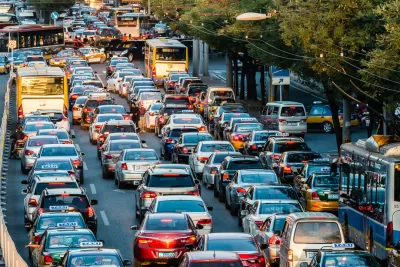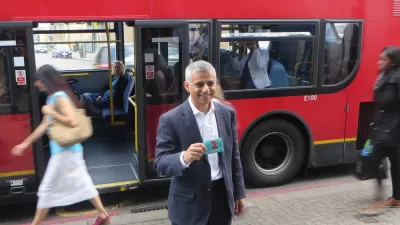Vehicle pollution is making cities around the world unlivable. Some cities have taken steps to curb auto use and emissions, with varying levels of success.

"At a time when most of humanity lives in cities, where do cars belong — especially the old, polluting ones that make city air foul for people to breathe?" ask Somini Sengupta and Nadja Popovich. They examine the efforts in a number of cities to limit and regulate driving as well as what has motivated particular strategies and the outcomes of policy measures.
London was an early adopter of congestion pricing, and the city added additional charges this year in an Ultra Low Emission Zone, which it plans to expand in 2021. "By October 2019, nitrogen dioxide levels in the air had declined by 36 percent compared to February 2017, according to an assessment by the city," note Sengupta and Popovich.
Beijing and New Delhi are two cities that have continued to struggle with poor air quality. Beijing instituted a license plate lottery, among other strategies, and pollution has decreased. "But, the city’s air quality still fails to meet national standards for fine particulate pollution and far exceeds levels the World Health Organization deems safe to breathe," say Sengupta and Popovich.
In New Delhi, measures to address pollution have been hindered by the large increase in the number of motorcycles, cars, and trucks that are belching out emissions, and air quality remains at hazardous levels.
Madrid has faced different roadblocks—namely, political maneuvering playing out around a ban on cars in the city center. Even with measured improvements in air quality, conservatives sought, unsuccessfully, to lift the ban. "The Spanish capital is in the throes of a heated debate about what kind of a city it wants to be, and cars are at the heart of it," write Sengupta and Popovich.
FULL STORY: Cities Worldwide Are Reimagining Their Relationship With Cars

Planetizen Federal Action Tracker
A weekly monitor of how Trump’s orders and actions are impacting planners and planning in America.

Congressman Proposes Bill to Rename DC Metro “Trump Train”
The Make Autorail Great Again Act would withhold federal funding to the system until the Washington Metropolitan Area Transit Authority (WMATA), rebrands as the Washington Metropolitan Authority for Greater Access (WMAGA).

The Simple Legislative Tool Transforming Vacant Downtowns
In California, Michigan and Georgia, an easy win is bringing dollars — and delight — back to city centers.

The States Losing Rural Delivery Rooms at an Alarming Pace
In some states, as few as 9% of rural hospitals still deliver babies. As a result, rising pre-term births, no adequate pre-term care and "harrowing" close calls are a growing reality.

The Small South Asian Republic Going all in on EVs
Thanks to one simple policy change less than five years ago, 65% of new cars in this Himalayan country are now electric.

DC Backpedals on Bike Lane Protection, Swaps Barriers for Paint
Citing aesthetic concerns, the city is removing the concrete barriers and flexposts that once separated Arizona Avenue cyclists from motor vehicles.
Urban Design for Planners 1: Software Tools
This six-course series explores essential urban design concepts using open source software and equips planners with the tools they need to participate fully in the urban design process.
Planning for Universal Design
Learn the tools for implementing Universal Design in planning regulations.
Smith Gee Studio
City of Charlotte
City of Camden Redevelopment Agency
City of Astoria
Transportation Research & Education Center (TREC) at Portland State University
US High Speed Rail Association
City of Camden Redevelopment Agency
Municipality of Princeton (NJ)





























